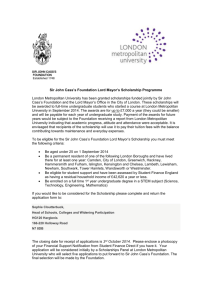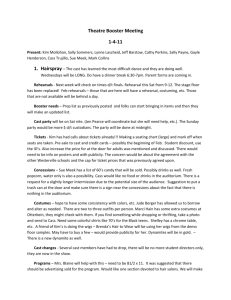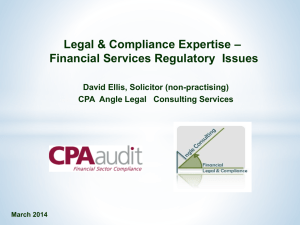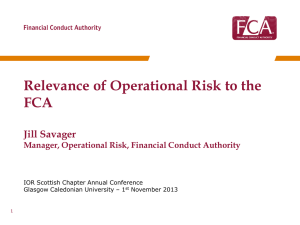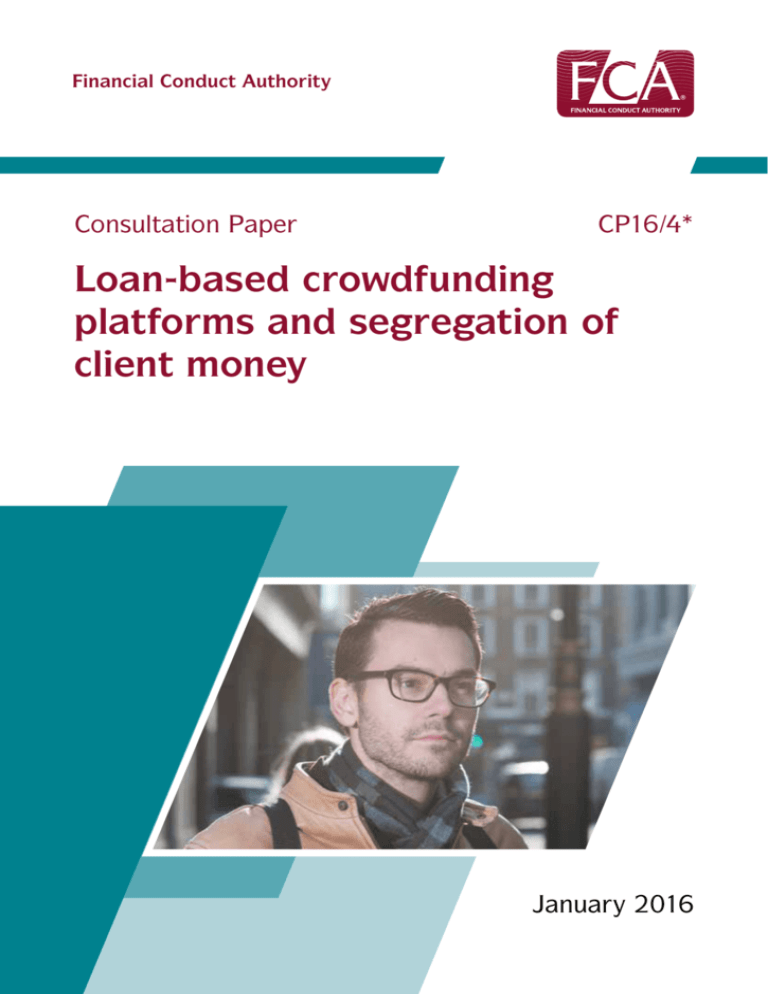
Financial Conduct Authority
Consultation Paper
CP16/4*
Loan-based crowdfunding
platforms and segregation of
client money
January 2016
Loan-based crowdfunding platforms and segregation of client money
CP16/4
Contents
Abbreviations used in this paper
3
1
Overview5
2
Loan-based crowdfunding
platforms and segregation of client money
7
Annexes
1
List of questions
10
2
Cost benefit analysis
11
3
Compatibility statement
12
Appendix
1
Draft Handbook text
Financial Conduct Authority
15
January 2016
1
We are asking for comments on this Consultation Paper by 11 February 2016.
You can send them to us using the form on our website at:
www.the-fca.org.uk/cp16-4-response-form.
Or in writing to:
Client Assets Department
Financial Conduct Authority
25 The North Colonnade
Canary Wharf
London E14 5HS
Email:cp16-04@fca.org.uk
We make all responses to formal consultation available for public inspection unless the respondent
requests otherwise. We will not regard a standard confidentiality statement in an email message as a
request for non-disclosure.
Despite this, we may be asked to disclose a confidential response under the Freedom of Information
Act 2000. We may consult you if we receive such a request. Any decision we make not to disclose the
response is reviewable by the Information Commissioner and the Information Rights Tribunal.
All our publications are available to download from www.fca.org.uk. If you would like to receive this
paper in an alternative format, please call 020 7066 0790 or email publications_graphics @fca.org.uk or
write to Editorial and Digital Department, Financial Conduct Authority, 25 The North Colonnade, Canary
Wharf, London E14 5HS
Loan-based crowdfunding platforms and segregation of client money
CP16/4
Abbreviations used in this paper
B2B
Business-to-business
CASS
Client Assets sourcebook
CP
Consultation paper
FCA
Financial Conduct Authority
FSMA
Financial Services and Markets Act 2000
IFISA
Innovative Finance Individual Savings Account
ISA
Individual Savings Account
P2P
Peer-to-peer
P2P agreement
Article 36H agreement, as defined in article 36H(4) of the RAO
PS
Policy statement
RAO
The Financial Services and Markets Act 2000
(Regulated Activities) Order 2001 (SI 2001/544)
Financial Conduct Authority
January 2016
3
Loan-based crowdfunding platforms and segregation of client money
1.
Overview
CP16/4
Introduction
1.1
In this consultation paper (CP) we consult on rules to simplify client money requirements for
firms that operate electronic systems in relation to lending (P2P platforms) and hold both
regulated and unregulated client money accounts.
Who does this consultation affect?
1.2
This paper will be of interest to:
• consumers and consumer organisations
• financial advisers
• firms operating loan-based crowdfunding platforms
• firms that wish to manage IFISAs
• trade bodies that represent stakeholders in this market
• compliance consultants and other firms that assist stakeholders
Context
1.3
Crowdfunding is a way in which people, organisations and businesses, including business
start-ups, can raise money through online portals (also known as crowdfunding platforms) to
finance or re-finance their activities. Money can be donated or invested in various ways by both
individuals and businesses. Some crowdfunding activity is unregulated, some is regulated and
some is exempt from regulation. This paper focuses on the regulated loan-based crowdfunding
sector, including P2P lending.
1.4
We took on responsibility for regulating firms that operate loan-based crowdfunding platforms
on 1 April 2014. Individuals can use these platforms to lend money to other individuals or
businesses, or businesses can use them to lend to individuals, in the hope of receiving a
financial return in the form of interest payments, together with repayment of capital. We do
not regulate firms when they operate platforms that facilitate business-to-business loans that
fall outside the scope of a P2P agreement.
Financial Conduct Authority
January 2016
5
CP16/4
Loan-based crowdfunding platforms and segregation of client money
1.5
1.6
Equality and diversity considerations
Under the Equality Act 2010, we are required to have due regard to the need to eliminate
discrimination and to promote equality of opportunity in carrying out our policies, services and
functions.
As part of this, we have assessed the likely equality and diversity impacts and rationale of these
proposals through an Equality Impact Assessment. We concluded they do not give rise to any
concerns for any particular groups as a result of any protected characteristic. Comments are
still welcome.
Next steps
6
1.7
Please send us your response to this CP by 11 February 2016. To submit a response, please use
the online response form on our website or write to us at the address on page 2.
1.8
Following consideration of feedback to this CP, we aim to publish a policy statement (PS)
making final rules in March 2016.
January 2016
Financial Conduct Authority
Loan-based crowdfunding platforms and segregation of client money
CP16/4
2.
Loan-based crowdfunding platforms and
segregation of client money
2.1
The scope of regulation of loan-based crowdfunding under article 36H of the RAO is limited
by the statutory definition of article 36H agreements under article 36H(4). Certain types of
loans are not article 36H agreements, even if facilitated in ways described in article 36H of the
RAO by firms operating loan-based crowdfunding platforms. The distinction between article
36H agreements and other loans depends on a number of factors including the type of lender
and borrower, the amount of the loan and its purpose from the borrower’s perspective. For
example, in general, if both parties to a loan are corporates then the loan would not be an
article 36H agreement and falls outside of regulation, including CASS.1
2.2
In this chapter, for simplicity, we refer to all non-article 36H agreements as ‘B2B agreements’
(as opposed to ‘P2P agreements’). This is because we understand that most non-article 36H
agreements involve businesses lending to other businesses.
2.3
Some firms operating loan-based crowdfunding platforms arrange both loans that are B2B
agreements and loans that are P2P agreements. Some lending arrangements facilitated by
these firms for a single borrower spread the risk of that borrower’s default amongst a number
of lenders, so that they are technically made up of a number of separate loans from several
lenders to that one borrower. That ‘bundle’ of loans to the single borrower can comprise
a mixture of B2B agreements and P2P agreements (including peer-to-business agreements),
depending on the application of the criteria in article 36H(4) of the RAO to each separate loan.
These arrangements are referred to by firms as ‘mixed loans’.
2.4
Currently, an investor’s money held by a firm in relation to P2P agreements (money to be lent
or received in repayments) would fall within the definition of client money for the purposes
of the client money rules in CASS 7; it must be segregated from the firm’s own money and
other money (including in relation to unregulated B2B agreements). This is the approach we
consulted on in CP13/13 and implemented in PS14/4.
2.5
We understand that some firms consider this burdensome as firms in the P2P industry have
generally not developed systems that distinguish between money held for the purposes of P2P
agreements and that held for B2B agreements. On insolvency, commingling in a way that is
not compliant with CASS could cause significant delay and expense in returning client money,
leading to consumer detriment.
2.6
We understand that many firms want to offer CASS protection to all lenders, both those
entering into P2P agreements and those entering into B2B agreements, and want to hold all
monies belonging to lenders together. However, we also note that some firms may prefer to
1 Regulated P2P activity only applies to loans meeting certain criteria. These include: the investor and/or borrower must be i) an
individual; ii) a partnership consisting of two or three persons not all of whom are bodies corporate; or iii) an unincorporated body
of persons which does not consist entirely of bodies corporate and is not a partnership. This means that business-to-business loans
that do not meet these criteria will not be regulated by the FCA.
Financial Conduct Authority
January 2016
7
CP16/4
Loan-based crowdfunding platforms and segregation of client money
hold money for clients of their B2B lending activities, involving only ‘whole loans’ from one
business to another business, separate from other client money (i.e. client money relating to
P2P agreements and ‘mixed loans’).
Proposed changes
2.7
So, we propose to allow firms that hold money in relation to both P2P and B2B agreements, to
be able to elect to hold all lenders’ monies under CASS 7 if they wish to do so. Firms may then
segregate P2P and B2B monies from the firms’ money, together, without breaching the CASS
rules and without necessarily needing to distinguish between P2P and B2B agreement monies.
However, if a firm does make the election to hold all P2P and B2B monies under CASS 7, then
all lender monies in relation to B2B agreements would need to be held as client money under
CASS 7, and the firm would not be able to rely on the professional client opt out.2 We are also
proposing to extend the existing FCA restriction against firms taking on full ownership of lender
monies under title transfer3, so that it covers the scope of the election. We believe this proposal
is likely to reduce, for some firms, the burden of compliance with CASS.
2.8
We believe this proposal will not adversely affect the level of consumer protection currently
enjoyed by clients of P2P agreements and will overall ensure greater consumer protection by
reducing complexity for firms. B2B agreements will continue to fall outside regulation, so if firms
are able to comply with the current rules they need not take any additional action.
2.9
Firms making the proposed election would need to keep a record of the decision and notify the
FCA and all their lender clients in writing. Similarly, on ceasing the election, firms would need
to notify B2B clients and the FCA. We believe that firms would incur only minimal costs when
making these notifications.
2.10
We believe that this proposal would offer greater certainty, on insolvency, for firms conducting
both P2P and B2B business. Where a firm has made the proposed election, all monies held by
a firm in relation to P2P and B2B agreements are treated as client money and, on insolvency,
would be dealt with in accordance with the client money distribution rules at CASS 7A. The
arrangements would be clear and simple for firms to implement, for clients to understand and
for the FCA to supervise. However, if firms are able to accurately segregate their P2P and B2B
monies separately, then they may continue to do this.
2.11
We also propose to clarify through guidance that, where a firm operating a loan-based
crowdfunding platform holds money that has not yet been invested for a client, this should be
client money held under the CASS rules, unless the circumstances are such that it could never
be invested in relation to a P2P agreement (for example, the firm contracted with the client
that its money would only be lent under a B2B agreement). As is currently the case, for loan
repayments, firms will be able to continue to use the mixed remittance rule at CASS 7.13.31R
which allows a firm to receive a single loan repayment from a borrower into a client bank
account and remove any B2B monies at the firm’s next daily reconciliation.
2.12
As noted above, some firms have told us they would prefer to hold client money from B2B
lending involving ‘whole loans’ from one business to another business separately from client
money held in relation to P2P agreements and ‘mixed loans’. We are proposing that firms that
make an election bring all their monies held in relation to B2B agreements into CASS. This
2 CASS 7.10.10R.
3 SYSC 4.1.8ER.
8
January 2016
Financial Conduct Authority
Loan-based crowdfunding platforms and segregation of client money
CP16/4
would prevent the rules being overly complex for firms to implement, for clients to understand
and for the FCA to supervise. However, under the proposed election, firms may be able to
make use of the trustee firm rules.4 The trustee firm rules mean that in relation to relevant
business, a reduced number of CASS 7 rules5 apply and firms have the ability to elect to comply
with further CASS 7 rules6, while holding the relevant monies on an express trust in accordance
with the trust deed governing that trust.
2.13
The trustee firm rules require a firm to hold client money for B2B lending separately from their
P2P business.7 On insolvency, any money held by the firm under the trustee rules would not be
subject to the pooling and distribution rules.8 The relevant terms of the trust would determine
the treatment of money held in this way.9
Q1: Do you have any comments on our proposal to allow
firms to elect to hold all their clients’ monies, in relation
to both P2P and B2B agreements, in line with CASS?
4
5
6
7
8
9
CASS
CASS
CASS
CASS
CASS
CASS
7.10.33R
7.10.34R
7.10.35R
7.10.36R
7A.1.1AR
7A.1.1BG
Financial Conduct Authority
January 2016
9
CP16/4
Loan-based crowdfunding platforms and segregation of client money
Annex 1
List of questions
Q1: Do you have any comments on our proposal to allow
firms to elect to hold all their clients’ monies, in relation
to both P2P and B2B agreements, in line with CASS?
Q2: Do you have any comments on our cost benefit analysis?
Q3: Do you have any comments on the compatibility
statement?
10
January 2016
Financial Conduct Authority
Loan-based crowdfunding platforms and segregation of client money
CP16/4
Annex 2
Cost benefit analysis
1.
FSMA requires us to publish a cost benefit analysis of our proposed rules. Specifically, section
138I requires us to publish a cost benefit analysis of proposed rules, defined as ‘an analysis of
the costs, together with an analysis of the benefits’ that will arise if the proposed rules are
made. It also requires us to include estimates of those costs and those benefits, unless these
cannot reasonably be estimated or it is not reasonably practicable to produce an estimate.
Our proposed rule changes
2.
We are proposing rules to simplify client money arrangements for firms that operate electronic
systems in relation to lending and hold both regulated and unregulated client money.
3.
We believe any costs for the proposals on the segregation of client money will be minimal. The
proposed change is optional for firms so firms can avoid any costs that may arise.
4.
Allowing firms to hold both P2P and B2B agreement monies together, in accordance with our
rules, would streamline industry compliance with CASS and reduce compliance costs for firms.
Money held for clients in relation to P2P agreements would continue to benefit from CASS
protections even where firms comingle money in relation to P2P and B2B agreements. Money
held for B2B clients would gain the benefit from CASS protections where a firm makes the
proposed election.
5.
The proposals could also reduce barriers to entry in the market, potentially leading to a greater
choice of firms for clients. The proposals could also reduce complexity for an insolvency
practitioner in the event of a firm failure, which could reduce costs and the time it takes for
client money and invested funds to be returned to clients.
Q2: Do you have any comments on our cost benefit analysis?
Financial Conduct Authority
January 2016
11
CP16/4
Loan-based crowdfunding platforms and segregation of client money
Annex 3
Compatibility statement
1.
We are required by section 138I(2)(d) of the Financial Services and Markets Act FSMA to explain
why we believe our proposed rules are compatible with our strategic objective, advance one or
more of our operational objectives, and have regard to the regulatory principles in section 3B
of FSMA. We are also required by section 138K(2) of FSMA to state whether the proposed rules
will have a significantly different impact on mutual societies as opposed to other authorised
persons.
2.
This annex also sets out our view of how the proposed rules are compatible with our duty to
discharge our general functions (which include rule making) in a way that promotes effective
competition in the interests of consumers (section 1B(4) of FSMA). This duty applies in so far as
promoting competition is compatible with advancing our consumer protection and/or integrity
objectives.
Our regulatory objectives
3.
The proposals in this CP are intended to advance our operational objectives of consumer
protection, effective competition and market integrity. We consider our proposals to be
compatible with these objectives because:
• They are based on our assessment of the risks applying to loan-based crowdfunding and
the needs of consumers. The rules on which we are consulting are focused on securing an
appropriate level of consumer protection currently provided to consumers.
• We recognise that crowdfunding has a role to play in the wider economy and it is our aim to
develop, as far as possible, a proportionate framework of rules that encourages beneficial
competition while reducing the possibility of ineffective competition. The rules we propose
promote effective competition in the interests of consumers by reducing fixed costs of entry
to the market.
• The rules we propose also advance our integrity objective by reducing complexity and
operational risk for firms.
12
January 2016
Financial Conduct Authority
Loan-based crowdfunding platforms and segregation of client money
CP16/4
Compatibility with the principles of good regulation
4.
The need to use our resources in the most efficient and economic way
The approach on which we are consulting builds on existing rules and guidance, rather than
creating new systems and processes, and may reduce the compliance burden on some firms.
5.
Proportionality of burdens or restrictions imposed on persons or on carrying on an
activity
We believe we are putting forward a proportionate approach that sets an appropriate level of
investor protection while minimising, as far as possible, burdens on firms and the impact on
competition, including competitive entry.
6.
The desirability of sustainable growth in the UK economy in the medium or long
term
We see crowdfunding as a sector that is likely to continue to grow and may start to exert
competitive pressure on other markets. As such, its significance in the medium- to long-term
may increase. Consequently we have sought to deliver a set of proposals that is proportionate
and ensure a sufficient degree of investor protection, while minimising, as far as possible, any
negative impact on competition and the long-term growth prospects of the crowdfunding
sector.
7.
The desirability of recognising differences in the nature of, and objectives of,
businesses carried on by different persons
Our proposals offer flexibility in complying with the investment business client money rules
that would be specific to loan-based crowdfunding platforms in recognition of the nature and
objective of their businesses.
8.
The responsibilities of senior management
Firms’ senior managers are responsible for ensuring their processes provide adequate protection
for investors.
9.
The desirability of publishing information relating to persons
We do not consider that our proposals will have an impact on this.
10.
The principle that we should exercise our functions as transparently as possible
We are using this CP to seek input into the approach we adopt. We invite feedback to help
shape the final rules and guidance to be introduced.
11.
The general principle that consumers should take responsibility for their decisions
Our proposed approach does not interfere with an investor’s responsibility for their financial
decisions and may offer investors more information on which to base their decisions.
12.
13.
Expected effect on mutual societies
At present, there are no mutual societies involved in providing regulated crowdfunding activities
so there should be no direct impact. If a mutual society was to enter the sector, it would be
expected to comply with our rules in the same way as other regulated firms.
Compatibility with the duty to promote effective competition in the interests of
consumers
We have a duty to discharge our general functions (which include rule making) in a way that
promotes effective competition in the interests of consumers (section 1B(4) FSMA). This duty
applies insofar as promoting competition is compatible with advancing our consumer protection
and/or integrity objectives.
Financial Conduct Authority
January 2016
13
CP16/4
Loan-based crowdfunding platforms and segregation of client money
14.
15.
As noted above, loan-based crowdfunding is likely to continue to grow and may start to
exert competitive pressure on neighbouring markets, including consumer and business loans
provided by other financial institutions. Our proposals may reduce fixed costs of entry into the
market and lead to an increase in competition without directly affecting the level of consumer
protection.
Legislative and Regulatory Reform Act 2006 (LRRA)
We are required under the LRRA to have regard to the principles in the LRRA and to the
Regulators’ Compliance Code when determining general policies and principles and giving
general guidance (but not when exercising other legislative functions).
16.
We have also considered the Regulators’ Compliance Code for the parts of the proposals that
consist of general policies, principles or guidance.
17.
We consider that the proposals are proportionate to the potential market failures identified.
Q3: Do you have any comments on the compatibility
statement?
14
January 2016
Financial Conduct Authority
Loan-based crowdfunding platforms and segregation of client money
CP16/4
Appendix 1
Draft Handbook text
Financial Conduct Authority
January 2016
15
FCA 2016/xx
CLIENT ASSETS SOURCEBOOK (AMENDMENT) INSTRUMENT 2016
Powers exercised
A.
The Financial Conduct Authority makes this instrument in the exercise of the
following powers and related provisions in the Financial Services and Markets Act
2000 (“the Act”):
(1)
(2)
(3)
(4)
B.
section 137A (The FCA’s general rules);
section 137B (FCA general rules: clients’ money, right to rescind etc);
section 137T (General supplementary powers); and
section 139A (Power of the FCA to give guidance).
The rule-making powers listed above are specified for the purpose of section 138G(2)
(Rule-making instruments) of the Act.
Commencement
C.
This instrument comes into force on [date] 2016.
Amendments to the Handbook
D.
The modules of the FCA’s Handbook of rules and guidance listed in column (1)
below are amended in accordance with the Annexes to this instrument listed in
column (2).
(1)
Glossary of definitions
Client Assets sourcebook (CASS)
Senior Management Arrangements, Systems and Controls sourcebook
(SYSC)
(2)
Annex A
Annex B
Annex C
Citation
E.
This instrument may be cited as the Client Assets Sourcebook (Amendment)
Instrument 2016.
By order of the Board
[date] 2016
FCA 2016/xx
Annex A
Amendments to the Glossary of definitions
Insert the following new definitions in the appropriate alphabetical position. The text is not
underlined.
non-P2P
agreement
an agreement between one person (“the borrower”) and another person
(“the lender”) by which the lender provides the borrower with credit,
which does not satisfy the conditions for being a P2P agreement.
operating an
electronic system
in relation to
non-P2P
agreements
the unregulated activity, carried on by a person who has part 4A
permission to operate an electronic system in relation to lending, of
carrying on the activity described in article 36H of the Regulated
Activities Order in relation to a non-P2P agreement or prospective nonP2P agreement.
P2P services
operating an electronic system in relation to lending or operating an
electronic system in relation to non-P2P agreements.
Page 2 of 9
FCA 2016/xx
Annex B
Amendments to the Client Assets sourcebook (CASS)
In this Annex, underlining indicates new text and striking through indicates deleted text,
unless otherwise stated.
7.10
Application and purpose
…
7.10.5
G
The opt-in to the client money rules in this chapter under CASS 7.10.3R does
not apply in respect of money that a firm holds outside of either the:
…
7.10.6
G
If a firm has opted to comply with this chapter under CASS 7.10.3R, the
insurance client money chapter will have no application to the activities to
which the election applies.
…
Loan-based crowdfunding
7.10.7A
7.10.7B
R
R
(1)
If both the following conditions are met in respect of a firm, or the firm
reasonably expects that they will all be met in the future, then the firm
has the option to elect to comply with this chapter for all of the money
described in these conditions:
(a)
the firm receives or holds money for one or more persons in the
course of, or in connection with, the firm’s activity of operating
an electronic system in relation to non-P2P agreements; and
(b)
those persons are customers of the firm in their capacity as
lenders under non-P2P agreements or prospective lenders under
non-P2P agreements.
(2)
A firm can only make the election under (1) by informing the FCA in
writing of the election at least one month before it will start holding the
money in accordance with the client money rules.
(1)
When a firm makes an election under CASS 7.10.7AR it must write to
any customer with whom it has agreed to provide P2P services in their
capacity as a lender or prospective lender, informing them at least one
month before it will start to hold the money in accordance with the
client money rules:
(a)
that all the money it holds in the course of, or in connection with,
operating an electronic system in relation to non-P2P
agreements for lenders and prospective lenders under non-P2P
agreements will be treated in accordance with the client money
Page 3 of 9
FCA 2016/xx
rules; and
(b)
(2)
7.10.7C
7.10.7D
R
R
of the date on which this will start.
The firm must also write to any customer with whom, following the
firm’s election, it agrees to provide P2P services in their capacity as a
lender or prospective lender.
(a)
The firm must make this communication in advance of it
receiving any money from or on behalf of any such customer.
(b)
The communication must inform the customer that all the money
the firm holds in the course of, or in connection with, operating
an electronic system in relation to non-P2P agreements for
lenders and prospective lenders under non-P2P agreements will
be treated in accordance with the client money rules from the date
specified under (1)(b) or, if that date has passed, that this will be
the case from the time of the communication onwards.
Once an election made by a firm under CASS 7.10.7AR takes effect, and until
it ceases to be effective:
(1)
the firm must treat all the money referred to under CASS 7.10.7AR(1)
in accordance with the election; and
(2)
for the purposes of (1), this chapter applies to the firm in the same way
that it applies to a firm that receives and holds money in the course of
or in connection with its designated investment business, except that:
(a)
CASS 7.10.10R will not apply to the money referred to under
CASS 7.10.7AR(1); and
(b)
‘client’ for the purposes of CASS and rules and guidance related
to CASS and their application to the firm includes customers of
the firm in their capacity as lenders or prospective lenders under
non-P2P agreements.
If a firm that has made an election under CASS 7.10.7AR subsequently
decides to cancel that election:
(1)
it can only do so by writing to the FCA, at least one month before the
date the election ceases to be effective;
(2)
it must write to any client with whom, as at the time of the
cancellation, it has agreed to operate an electronic system in relation to
non-P2P agreements in their capacity as a lender or prospective lender,
informing them at least one month before the date the election ceases to
be effective:
(a)
of the extent to which it will cease to hold their money in
accordance with the client money rules; and
Page 4 of 9
FCA 2016/xx
(b)
(3)
7.10.7E
R
(1)
(2)
7.10.7F
G
(1)
of the date from which those changes will take effect; and
it must write to any client with whom, following the firm’s decision to
cancel the election but before the election ceases to be effective, it
agrees to operate an electronic system in relation to non-P2P
agreements in their capacity as a lender or prospective lender,
informing them in advance of the firm receiving any money from them
or on their behalf:
(a)
of the period during which it will continue to hold all the money
of lenders and prospective lenders under non-P2P agreements in
accordance with the client money rules;
(a)
of the extent to which it will subsequently cease to hold their
money in accordance with the client money rules; and
(b)
of the date from which those changes will take effect.
A firm must make and retain a written record of any election it makes
under CASS 7.10.7AR including:
(a)
the date from which the election is to be effective; and
(b)
if it cancels the election, the date from which the election is to
cease to be effective.
The firm must:
(a)
make the record on the date it makes the election;
(b)
update the record it if it decides to cancel the election; and
(c)
keep the record for a period of five years after ceasing to use the
election.
Where a firm has made an election under CASS 7.10.7AR:
(a)
it should treat money held for a client as client money both in the
course of or in connection with:
(i)
operating an electronic system in relation to lending; and
(ii)
operating an electronic system in relation to non-P2P
agreements;
(b)
(a) is regardless of whether, at the time the firm is holding the
money, the client could or could not be a lender under a P2P
agreement; and
(c)
under SYSC 4.1.8ER(2) it will be not be able to accept, take, or
receive the transfer of full ownership of money relating to non-
Page 5 of 9
FCA 2016/xx
P2P agreements.
(2)
Where a firm has not made an election under CASS 7.10.7AR, or where
it has previously made an election but the election has ceased to be
effective under CASS 7.10.7DR, any money it holds:
(a)
in the course of, or in connection with P2P services, for a client
who at that time will or could be a lender under a P2P
agreement in respect of that money should be treated as client
money (for example because that client’s contractual investment
criteria permits that money to be invested in a P2P agreement);
and
(b)
in the course of, or in connection with, operating an electronic
system in relation to non-P2P agreements, for a customer who
at that time could not be a lender under a P2P agreement in
respect of that money should not be treated as client money (for
example because that customer’s contractual investment criteria
only permits that money to be invested in a non-P2P
agreement).
…
7.10.8
G
CASS 7.10.9G to CASS 7.10.15G do not apply to a firm in relation to money
held in connection with its MiFID business to which this chapter applies or in
relation to money for which the firm has made an election under CASS 7.10.3
R(1) or CASS 7.10.7AR.
…
TP 1
Transitional Provisions
TP 1.1
(1)
(2)
(3)
Material to which
the transitional
provision applies
(4)
(5)
(6)
Transitional provision
Transitional
provision: date
in force
Handbook
provisions:
coming into
force
A firm need not give the
FCA at least one month’s
notice under this rule, if it
informs the FCA
immediately at the time of
making the election under
From [date
this instrument
comes into
effect] to [one
month after]
[date this
instrument
comes into
effect]
…
9C
CASS
7.10.7AR(2)
R
Page 6 of 9
FCA 2016/xx
CASS 7.10.7AR(1).
9D
CASS
7.10.7BR(1)
R
A firm need not give
customers at least one
month’s advance notice
under this rule, if it
informs customers as soon
as practicable at the time
of making the election
under CASS 7.10.7AR.
…
Page 7 of 9
From [date
this instrument
comes into
effect] to [one
month after]
[date this
instrument
comes into
effect]
FCA 2016/xx
Insert the following new row in the appropriate numerical position in Schedule 1 (Record
keeping requirements). The new text is not underlined.
Sch 1.3G
Handbook
reference
Subject of
record
Contents of
record
When record
must be made
The election
made under
CASS 7.10.7AR.
The election
including the
date from which
the election is to
be effective and,
if it cancels the
election, the date
from which the
election is to
cease to be
effective.
At the time of
the election
and, if it
cancels the
election, at the
time it is
cancelled.
Retention period
…
CASS
7.10.7ER
Five years after
ceasing to use the
election
…
Insert the following new rows in the appropriate numerical position in Schedule 2
(Notification requirements). The new text is not underlined.
Sch 2.1G
Handbook
reference
Matter to be
notified
Contents of
notification
Trigger
event
Time allowed
…
CASS
7.10.7AR(2)
The firm’s
election under
CASS
7.10.7AR(1).
The firm’s
election under
CASS
7.10.7AR(1).
Making the
election
At least one month
before the date on
which the firm’s
election is to be
effective.
CASS
7.10.7DR(1)
The cancellation
of the firm’s
election under
CASS
7.10.7AR(1).
The
cancellation
of the firm’s
election under
CASS
7.10.7AR(1).
Cancelling
the election
At least one month
before the date on
which the firm’s
election is to cease to
be effective.
…
Page 8 of 9
FCA 2016/xx
Annex C
Amendments to the Senior Management Arrangements, Systems and Controls
sourcebook (SYSC)
In this Annex, underlining indicates new text.
4.1
General requirements
…
4.1.8E
R
(1)
An operator of an electronic system in relation to lending must not
accept, take, or receive the transfer of full ownership of money relating
to P2P agreements.
(2)
If an operator of an electronic system in relation to lending has made a
client money election under CASS 7.10.7AR, when it is operating an
electronic system in relation to non-P2P agreements it must also not
accept, take, or receive the transfer of full ownership of money relating
to non-P2P agreements.
…
Page 9 of 9
Financial Conduct Authority
PUB REF: 005203
© Financial Conduct Authority 2016
25 The North Colonnade Canary Wharf
London E14 5HS
Telephone: +44 (0)20 7066 1000
Website: www.fca.org.uk
All rights reserved



